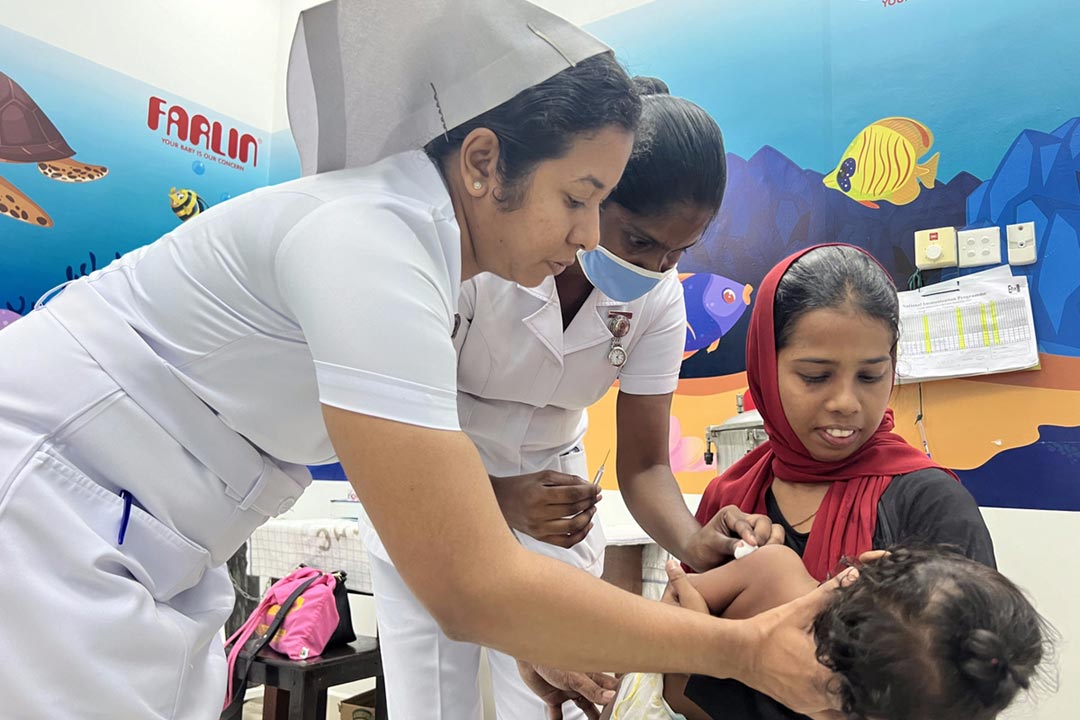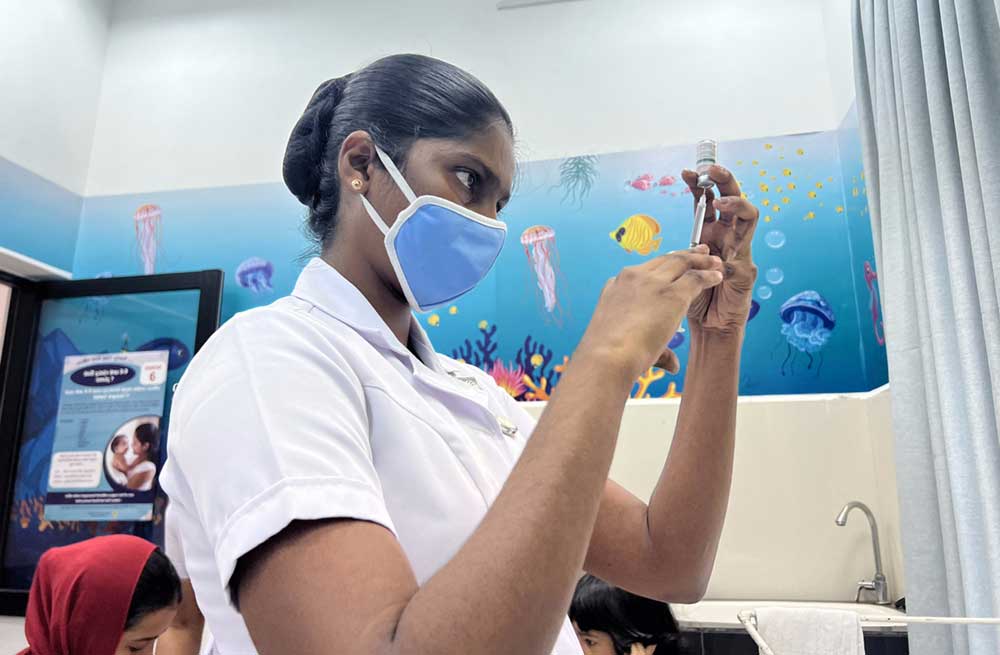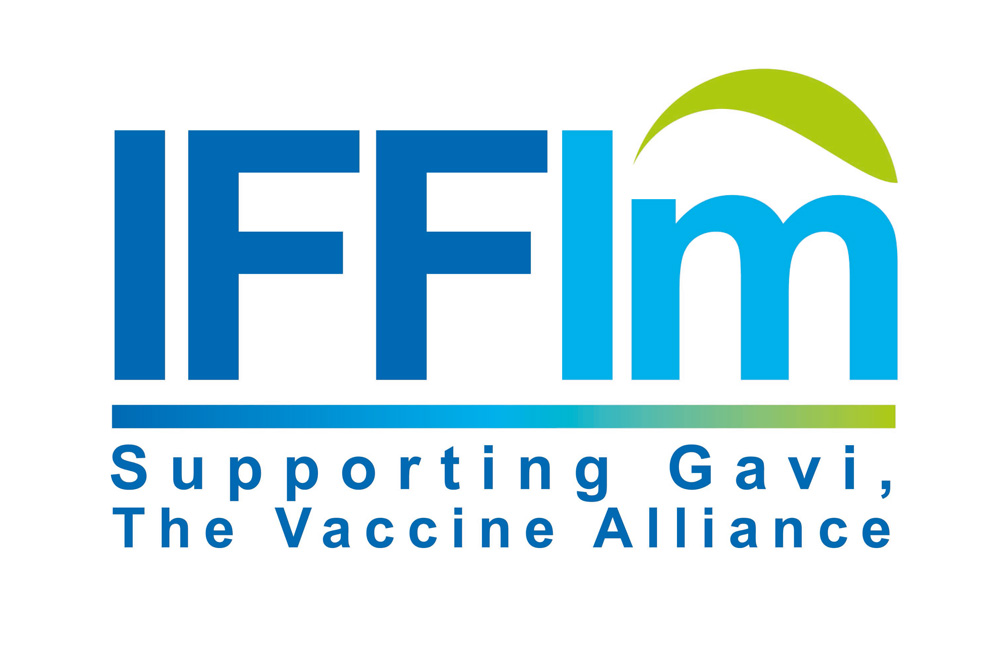Sri Lanka achieves hepatitis B control: “We are on track for elimination”
- Impact
- Sri Lanka achieves hepatitis B control: “We are on track for elimination”
Sri Lanka achieves hepatitis B control: “We are on track for elimination”
21 February 2024

R. Dhaarmika supervises a midwife at a Maternal and Child Welfare Center in Colombo. Credit: Aanya Wipulasena
Leaders credit public trust in the health care system and a popular appreciation of the value of vaccination.
Leaders credit public trust in the health care system and a popular appreciation of the value of vaccination.
Announcements
IFFIm impact: hepatitis B
IFFIm supports Gavi’s hepatitis B vaccine programmes with US$ 13 million in funding.
R Dhaarmika, a Public Health Nursing Sister, often works long hours. After a full day's work as a supervisor at a maternal and child welfare centre in Colombo, Sri Lanka, she frequently stays behind to meticulously record what happened that day, such as how many vaccines were used, and what materials need restocking.

It's a demanding job, but Dhaarmika says she loves it: "I enjoy my work very much. What we (health workers) do is a community service. It is nice to see children in my area healthy."
What makes it even better? When Dhaarmika's contribution helps the country to achieve important health milestones. On January 17 this year, the World Health Organization (WHO) announced that the Maldives and Sri Lanka have achieved hepatitis B control, having "consistently high coverage of hepatitis B vaccine doses in infants and a low prevalence of the deadly disease".
“Simultaneously, we did the same survey with pregnant mothers. The prevalence (of hepatitis B) among them was also zero. This is a very good sign. We are on track to go for elimination."
– Dr Samitha Ginige
"Hepatitis control continues to be an important public health initiative in the South-East Asia Region of WHO that comprises of 11 countries and is home to a quarter of the world's population. The Region has an estimated 60 million people living with chronic hepatitis B and 218,000 dying every year of hepatitis B and C," WHO stated in a news release.
Prevalence: zero
In Sri Lanka, a 2022–2023 survey for hepatitis B infection among children aged over five conducted by the Epidemiology Unit of the country's Ministry of Health, found a prevalence – that is, number of positive cases – of zero.
"Simultaneously, we did the same survey with pregnant mothers. The prevalence (of hepatitis B) among them was also zero. This is a very good sign," Dr Samitha Ginige, the Head of the Epidemiology Unit said.
"We are on track to go for elimination," he added.
Public trust
According to Dr Ginige, Sri Lanka achieves such milestones because of the well-established public health infrastructure that can cater to any demand. As in most countries, in Sri Lanka, immunisation is incorporated into the primary health care delivery system, and vaccines are administered free of charge to all children and pregnant mothers.

Credit: Aanya Wipulasena
"We provide the pentavalent vaccine that gives protection against five diseases including hepatitis B and polio to children who have completed two months, four months, and six months," Dr Ginige explained.
Hepatitis B vaccination is also given to health care workers and those in identified high-risk groups, such as sex workers and people using injectable drugs.
Dr Ginige said the recent success reflected the high acceptance of immunisation among mothers. Even during the COVID-19 outbreak, despite temporary delays, the country was able to sustain its nearly 100% immunisation coverage.
"People understand the value of vaccines. It is also a free health care delivery system. Without any cost, all children are eligible to get their due vaccination without any hassle. We also have a good tracking system in place.
"Children are registered at birth. Midwives follow up periodically and provide due vaccination on time. There is also a good evaluation mechanism in place," he said, adding that the main thing is 'public trust' in the public health system. "When a midwife asks to vaccinate their children, mothers do without resistance."
“People understand the value of vaccines. It is also a free health care delivery system. Without any cost, all children are eligible to get their due vaccination without any hassle. We also have a good tracking system in place."
– Dr Samitha Ginige, Head of the Epidemiology Unit, Ministry of Health
Reflecting on the recent achievement, Dr Ginige said that this was a "significant" milestone in Sri Lanka's immunisation programme.
"It is a collective thing. Vaccination is the key governing factor for this achievement," he said.
Complacency risk
At the Maternal and Child Welfare Center where Dhaarmika works, the day starts early in the morning. The waiting room gets crowded with mothers and their babies. A medical officer, pregnant herself, informs the mothers what needs to be done.
"Stay for at least 20 minutes after the vaccination. If your baby develops a fever, give paracetamol. If it persists, consult a doctor," she says.
Thirty-eight-year-old Chenashi Dinsadi, is with her baby, who has received all three doses of the pentavalent vaccine.
"This is my third child. My other two children were also vaccinated here. The medical officers here are very nice and give us advice about children's health. What they are doing is an important service," she says.
But a new challenge that health care workers are experiencing is vaccine refusals on the part of mothers who have opted for home deliveries.
According to Dr Chintha Jayampathi, Deputy Chief Medical Officer of Health, this is because they don't see vaccine-preventable diseases. "So, they think, why do they need to take a risk by vaccinating their children," she says.
Health officials who work at the grassroots level are making sure that these babies don't fall between the cracks.
"It is a team effort. We have midwives going to homes to meet mothers. The relationship between mothers and midwives is very strong. And these midwives encourage all mothers to vaccinate their children, because prevention is better than cure," she says.
 | This article is republished from VaccinesWork under a Creative Commons license. Read the original article. VaccinesWork is an award-winning digital platform hosted by Gavi, the Vaccine Alliance covering news, features and explainers from every corner of global health and immunisation. |
Share this article
Restricted Access Library
 The material in this Restricted Access Library is intended to be accessed only by persons with residence within the territory of a Member State of the European Union and is not intended to be viewed by any other persons. The material in this Restricted Access Library is provided by IFFIm for information purposes only and the materials contained herein were accurate only as of their respective dates. Certain information in the materials contained herein is not intended to be, and is not, current. IFFIm accepts no obligation to update any material contained herein.
The material in this Restricted Access Library is intended to be accessed only by persons with residence within the territory of a Member State of the European Union and is not intended to be viewed by any other persons. The material in this Restricted Access Library is provided by IFFIm for information purposes only and the materials contained herein were accurate only as of their respective dates. Certain information in the materials contained herein is not intended to be, and is not, current. IFFIm accepts no obligation to update any material contained herein.
Persons with residence outside the territory of a Member State of the European Union who have access to or consult any materials posted in this Restricted Access Library should refrain from any action in respect of the securities referred to in such materials and are otherwise required to comply with all applicable laws and regulations in their country of residence.
By clicking Access restricted content: DYNAMIC-LINK-TEXT I confirm that I have read and understood the foregoing and agree that I will be bound by the restrictions and conditions set forth on this page.
The materials in this Restricted Access Library are for distribution only to persons who are not a "retail client" within the meaning of section 761G of the Corporations Act 2001 of Australia and are also sophisticated investors, professional investors or other investors in respect of whom disclosure is not required under Part 6D.2 of the Corporations Act 2001 of Australia and, in all cases, in such circumstances as may be permitted by applicable law in any jurisdiction in which an investor may be located.
The materials in this Restricted Access Library and any documents linked from it are not for access or distribution in any jurisdiction where such access or distribution would be illegal. All of the securities referred to in this Restricted Access Library and in the linked documents have been sold and delivered. The information contained herein and therein does not constitute an offer for sale in the United States or in any other country. The securities described herein and therein have not been, and will not be, registered under the U.S. Securities Act of 1933, as amended (the "Securities Act"), and may not be offered or sold in the United States except pursuant to an exemption from, or in a transaction not subject to, the registration requirements of the Securities Act and in compliance with any applicable state securities laws.
Each person accessing the Restricted Access Library confirms that they are a person who is entitled to do so under all applicable laws, regulations and directives in all applicable jurisdictions. Neither IFFIm nor any of their directors, employees, agents or advisers accepts any liability whatsoever for any loss (including, without limitation, any liability arising from any fault or negligence on the part of IFFIm or its respective directors, employees, agents or advisers) arising from access to Restricted Access Library by any person not entitled to do so.
"Relief" for mothers in Bayelsa state as malaria vaccine makes waves
07 November 2025
